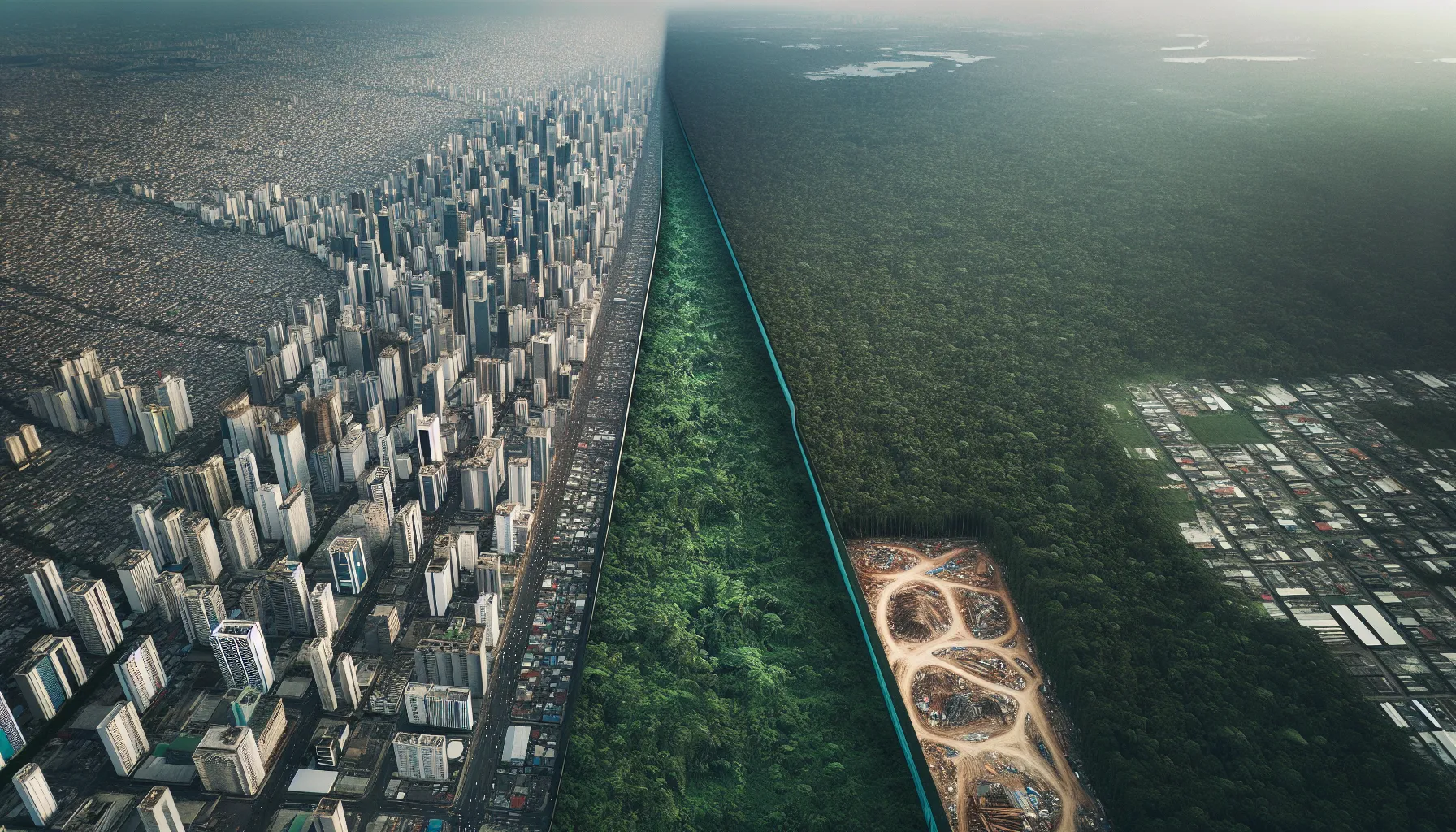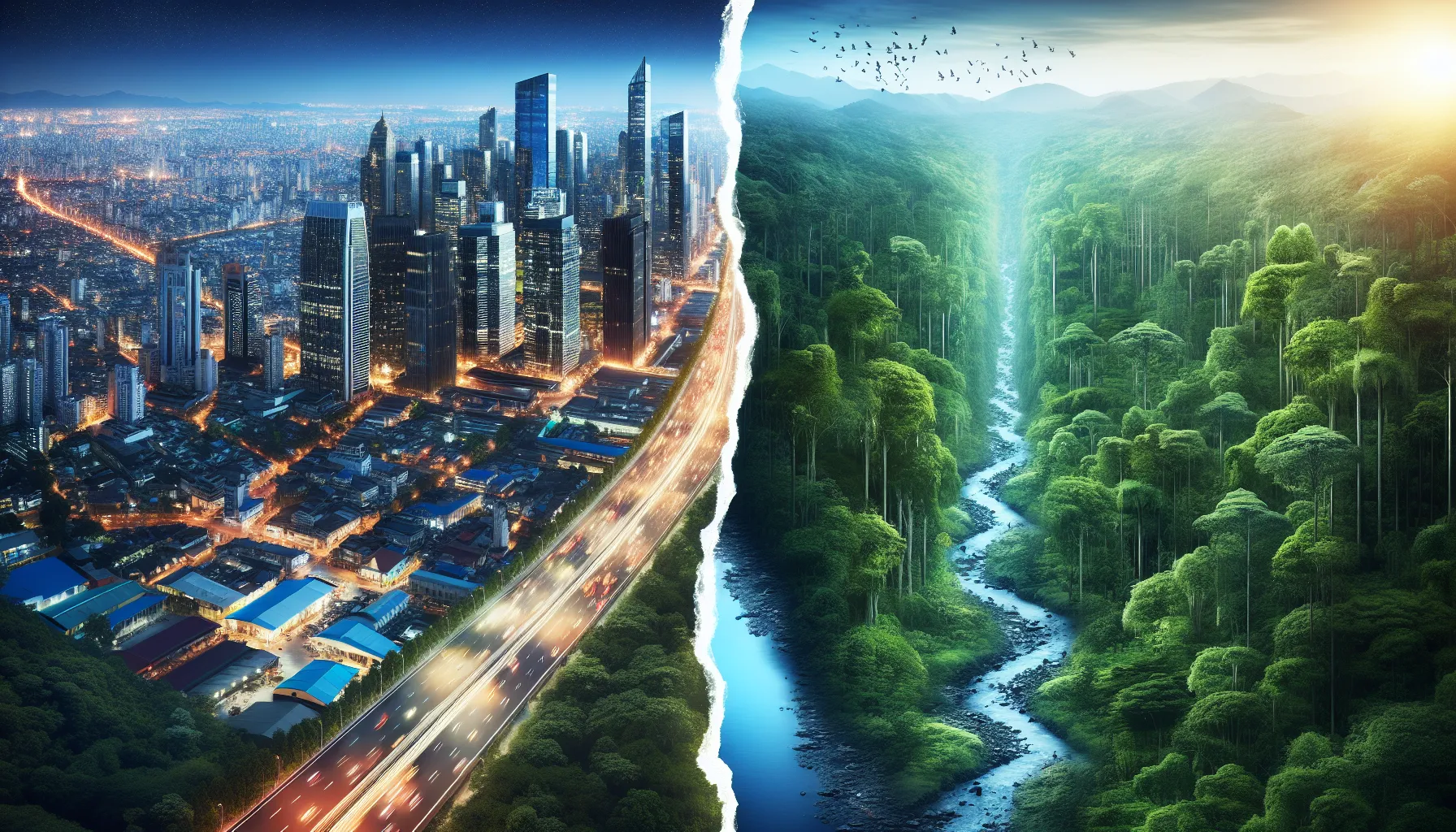Urbanization and its effects on natural resources is a topic that frequently appears in IELTS Writing Task 2. Based on past exam trends and current global issues, there’s a high probability of encountering this theme in future tests. Let’s explore this topic through sample essays and analysis, focusing on how urbanization is affecting natural resources.
Analyzing the Essay Question
Let’s examine a potential IELTS Writing Task 2 question on this topic:
Some people believe that the rapid growth of cities is leading to a significant depletion of natural resources. To what extent do you agree or disagree with this view?
This question requires you to:
- Understand the relationship between urban growth and natural resource depletion
- Form an opinion on the extent of this relationship
- Provide reasons and examples to support your viewpoint
Sample Essays for Different Band Scores
Band 8-9 Essay Sample
The relentless expansion of urban areas is often perceived as a double-edged sword, bringing economic progress but also environmental concerns. I firmly agree with the view that rapid urbanization is significantly depleting our natural resources, and this essay will elucidate the reasons behind this stance.
Firstly, the voracious appetite of growing cities for land and raw materials is undeniably straining our natural resources. As urban boundaries push outwards, vast tracts of forests, wetlands, and agricultural lands are being consumed. This not only destroys habitats but also reduces the earth’s capacity to regenerate resources. For instance, the expansion of cities like São Paulo in Brazil has led to extensive deforestation in the Amazon, compromising the region’s biodiversity and its role as a carbon sink.
Moreover, the concentration of population in cities leads to an intensified demand for energy and water, further depleting these crucial resources. Urban dwellers typically consume more energy for transportation, heating, and cooling than their rural counterparts. Cities like Dubai, for example, require enormous amounts of energy to maintain their modern infrastructure in a harsh desert environment, putting immense pressure on fossil fuel reserves.

However, it’s important to note that urbanization, when managed sustainably, can potentially mitigate resource depletion. Compact city designs can reduce land use and transportation needs, while green building technologies can minimize energy consumption. Singapore exemplifies this approach, implementing vertical gardens and efficient public transport to balance urban growth with resource conservation.
In conclusion, while the correlation between rapid urban growth and natural resource depletion is strong, it’s not an inevitable outcome. The key lies in adopting sustainable urban planning practices that prioritize resource conservation alongside development. As we continue to urbanize, it’s imperative that we find this balance to ensure the longevity of our natural resources for future generations.
(Word count: 298)
Band 6-7 Essay Sample
In recent years, the growth of cities has become a hot topic, especially when it comes to how it affects our natural resources. I agree that rapid urbanization is causing significant depletion of natural resources, and I will explain why in this essay.
One main reason is that building cities requires a lot of materials from nature. When we construct new buildings, roads, and other infrastructure, we use resources like wood, metals, and stone. This means we have to cut down more trees and dig up more land to get these materials. For example, in China, the fast growth of cities has led to a big increase in demand for construction materials, which has resulted in more mining and deforestation.
Another important point is that cities use up a lot of energy and water. People living in cities tend to use more electricity for things like air conditioning, lighting, and running appliances. They also often use more water for daily activities. This puts a strain on our energy resources and water supplies. In India, for instance, many cities are facing water shortages because of the growing urban population and increased water usage.
However, it’s also true that some cities are trying to be more environmentally friendly. They are using renewable energy sources like solar power and implementing water conservation methods. This shows that with good planning, cities can grow without using up too many resources.
In conclusion, while I believe that rapid urban growth is indeed causing significant resource depletion, there are ways to make cities more sustainable. It’s important for governments and city planners to focus on sustainable development to protect our natural resources for the future.
(Word count: 269)
Band 5-6 Essay Sample
Many people think that as cities grow quickly, they use up a lot of natural resources. I agree with this idea because I can see how big cities affect nature.
First, when cities get bigger, they need more land. This means cutting down trees and using up farmland to build houses and roads. For example, in my country, I have seen forests disappear to make space for new buildings. This is bad for animals and plants.
Second, people in cities use a lot of water and electricity. They need water for drinking, washing, and other things. They also use electricity for lights, air conditioners, and computers. This means we have to use more water from rivers and burn more coal for electricity. In big cities like New York or Tokyo, the amount of energy used is very high.
But some cities are trying to be better for the environment. They are using solar panels and recycling water. This is good, but I think it’s not enough to stop all the problems.
In conclusion, I believe that growing cities do use up a lot of natural resources. We need to be careful about how we build cities so we don’t use all our resources too quickly.
(Word count: 193)
Explaining the Scores for Each Sample Essay
Band 8-9 Essay Analysis
This essay demonstrates excellence in several key areas:
-
Task Response: The essay fully addresses all parts of the task, presenting a clear position with well-developed ideas and relevant examples.
-
Coherence and Cohesion: The essay is logically organized with clear progression throughout. It uses a range of cohesive devices effectively.
-
Lexical Resource: It showcases a wide range of vocabulary used with full flexibility and precision. For example, “voracious appetite”, “straining our natural resources”, “mitigate resource depletion”.
-
Grammatical Range and Accuracy: The essay uses a wide range of structures with full flexibility and accuracy. It demonstrates consistent control of complex language.
-
Critical Thinking: The essay not only presents the negative impacts but also considers potential solutions, showing depth of analysis.
Band 6-7 Essay Analysis
This essay shows good control of language with some areas for improvement:
-
Task Response: The essay addresses all parts of the task, though some aspects are covered more thoroughly than others.
-
Coherence and Cohesion: The essay is generally well-organized, but the use of cohesive devices could be more sophisticated.
-
Lexical Resource: It uses a sufficient range of vocabulary, with some less common items like “infrastructure” and “deforestation”, but could benefit from more precise word choice in places.
-
Grammatical Range and Accuracy: The essay uses a mix of simple and complex sentence structures, with generally good control, though there are occasional errors.
-
Examples: The essay provides relevant examples, which strengthens the argument, but they could be more detailed.
Band 5-6 Essay Analysis
This essay demonstrates basic competence but has several limitations:
-
Task Response: The essay addresses the main points of the task but lacks depth in its response.
-
Coherence and Cohesion: There is a clear overall structure, but paragraphing could be more effective, and the use of cohesive devices is limited.
-
Lexical Resource: The vocabulary is adequate for the task but lacks range and precision. There’s repetition of basic words and phrases.
-
Grammatical Range and Accuracy: Sentence structures are mostly simple, with limited use of complex sentences. There are some grammatical errors, but they don’t impede communication.
-
Development of Ideas: Ideas are present but not fully developed. Examples are general rather than specific.
Key Vocabulary to Remember
- Urbanization (noun) /ˌɜːrbənaɪˈzeɪʃən/ – The process of making an area more urban
- Depletion (noun) /dɪˈpliːʃən/ – The reduction or use of something until there is very little left
- Sustainable (adjective) /səˈsteɪnəbl/ – Able to continue over a period of time without damaging the environment
- Infrastructure (noun) /ˈɪnfrəstrʌktʃər/ – The basic systems and services that a country or organization uses in order to work effectively
- Biodiversity (noun) /ˌbaɪoʊdaɪˈvɜːrsəti/ – The variety of plant and animal life in a particular habitat
- Mitigate (verb) /ˈmɪtɪɡeɪt/ – To make something less harmful, unpleasant, or bad
- Conservation (noun) /ˌkɑːnsərˈveɪʃən/ – The protection of plants and animals, natural areas, and interesting and important structures and buildings
- Renewable (adjective) /rɪˈnjuːəbl/ – A renewable energy source can be easily replaced or renewed
- Strain (noun) /streɪn/ – A demand on or pressure on something
- Voracious (adjective) /vəˈreɪʃəs/ – Wanting or eating large amounts of food, or using large amounts of something
Conclusion
The impact of urbanization on natural resources is a critical topic in IELTS Writing Task 2. It requires a balanced approach, considering both the challenges and potential solutions. To excel in this task, focus on:
- Clearly stating your position
- Providing specific examples
- Using a range of vocabulary and complex sentence structures
- Considering multiple perspectives
- Organizing your ideas logically
For practice, try writing an essay on this related topic: “Some people argue that technological advancements can solve the environmental problems caused by urbanization. To what extent do you agree or disagree?” Share your essay in the comments section for feedback and discussion. This active practice is an excellent way to improve your IELTS writing skills.
Remember, consistent practice and learning from feedback are key to improving your IELTS Writing Task 2 performance. Good luck with your preparation!
